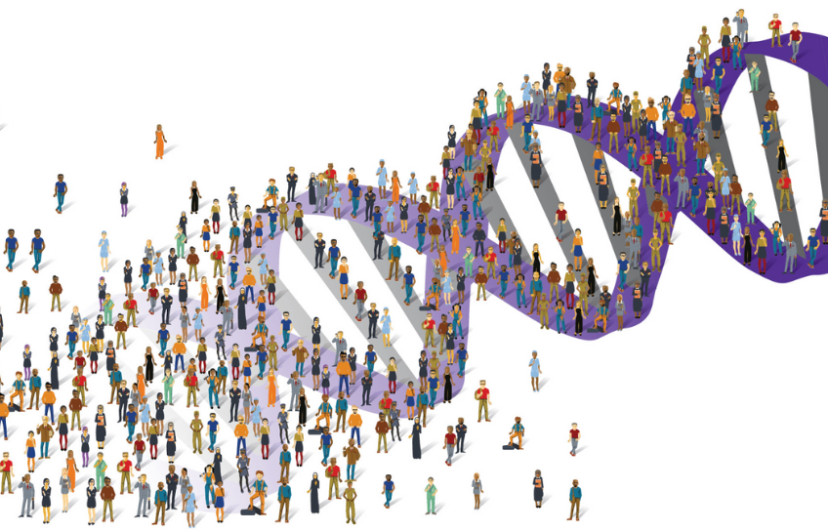
Finale Meeting of the NHGRI Centers of Excellence in Ethical, Legal and Social Implications (ELSI) Research (CEER) Program
The Centers for Excellence in ELSI Research (CEER) Program, a set of research centers across the United States funded by the National Human Genome Research Institute (NHGRI) to promote interaction among investigators of different disciplines and increase the pool of ELSI researchers, held its “finale” meeting May 1 and 2 of 2024 at Vanderbilt University. This gathering of investigators from current and former CEER sites and NHGRI staff was graciously hosted by Ellen Wright Clayton, Jay Clayton, and Brad Malin, all professors at Vanderbilt and co-directors or faculty of the Center for Genetic Privacy and Identity in Community Settings (GetPreCiSe), a CEER funded to develop a comprehensive understanding of concerns about genetic privacy and identity and model risks. The meeting was the culmination of 20 years (yes, 20 years) of the centers for excellence concept, a novel, somewhat experimental approach to ELSI research. Attendees shared their reflections, sometimes emotional, about what we learned from the CEER experiment and can take away and use to inform the future of ELSI research.
After a warm welcome by Larry Brody, the director of the NHGRI Division of Genomics and Society, Dave Kaufman, a program director at the division, and Sarah Anstice, a scientific program analyst, presented their own assessment of the impacts of CEERs, focusing on the centers’ main goals: transdisciplinarity, training, and convening. The CEERs had a small, measurable effect on increasing the number of disciplines represented in the author lists of CEER publications and arguably had a large impact on training and trainee success by enabling trainee participation in CEER activities and support with CEER-associated training grants (such as those using the NIH R25 Research Education Program funding mechanism).
The meeting highlighted the outsized role that the CEERs played in growing relationships, between people trained in the different disciplines that contribute to ELSI research, and between ELSI researchers and genome scientists, community members, and community-based organizations. Of note are the relationships forged by two CEERs, the Center for the Ethics of Indigenous Genomic Research and the Center for Genomics and Healthcare Equality, which were structured to focus on partnerships with Indigenous, underrepresented, and medically underserved communities. The ten-year period of funding for most CEERs enabled relationships to grow and solidify. Meeting attendees also highlighted the important role the existence of a real center played in creating a sense of community that included people from many disciplines, career stages, interests, and backgrounds.
Guest speaker Khara Ramos, Vice President of Neuroscience & Society at the Dana Foundation, reinforced the importance of communities in shaping scientific research agendas, and the significance of relationship-building, trust, and trustworthiness in designing and conducting ethically, legally, and socially-robust science. Many meeting participants noted that the outcome of relationship building—while critical to robust ELSI research and time-intensive to develop—is difficult to measure and difficult to achieve within the confines of a standard NIH-funded research project. Traditional research productivity outcomes such as numbers of publications and grants are easier to document, but do not begin to capture the value of trust, trustworthiness, and collaboration. Centers, in contrast, allowed inclusion of diverse personnel and community building efforts that are not tied to a specific research project (such as the type funded by an NIH R01). The longevity and flexibility that the CEER program had to support the long-term development of relationships will be challenging to replicate with other funding mechanisms.
In a lively panel session moderated by Sandra Soo-Jin Lee, Chief of the Division of Ethics, and a professor at Columbia University, meeting participants discussed the challenges of “embedded ELSI” in genomic research and other scientific areas, such as artificial intelligence (AI) and neuroscience. Although ELSI scholars never need an excuse to debate, Kyle Brothers, an associate professor at the University of Louisville, intentionally issued the provocation that embedded ELSI would one day be an anachronism because achieving true transdisciplinarity would erase the boundaries between the embedded ELSI researchers and those of entity in which they are embedded. While there was no agreement on how likely or when these boundaries would dissolve, there was a consensus that the CEERs moved the needle towards transdisciplinarity by helping to overcome the structural barriers in academia that disincentivize community engagement and collaboration.
Perhaps the strongest influence of the CEER program that meeting participants identified was its ability to seed the next generations of ELSI researchers with its education programs. Attendee, Aaron Goldenberg, a professor at Case Western Reserve University (CWRU) claimed an identity as a “CEER baby” or a person who had lived nearly his entire career—from traineeship, to academic faculty, to ELSI leadership positions—affiliated with the Center for Genetic Research Ethics and Law (CGREAL) at CWRU. He confessed to still meeting regularly with other “CEER babies” years after NHGRI funding for the CGREAL had ended. Others noted that CEER trainees and faculty either visited or found future employment at other CEER sites, thus strengthening the network of ELSI scholars.
The CEER program trained dozens of undergraduates, post-baccalaureates, graduate students, and post-doctoral fellows. Meeting participants agreed that these trainees were the glue that held the CEERs together and gave them vitality. Two former CEER sites, Stanford University (once home to a CEER called Center for Integration of Research on Genetics and Ethics) and the University of Pennsylvania (former host of the Center for the Integration of Genetic Healthcare Technology), now have institutional training programs funded by T32 NIH grants. Three, including the Center for Bridging Infectious Disease, Genomics, and Society at Johns Hopkins University, the Utah Center of Excellence in Ethical, Legal and Social Implications Research at the University of Utah, and the Center for the Ethics of Indigenous Genomic Research, a collaboration between Indigenous professionals, Native-serving organizations, tribal stakeholders, and faculty at the University of Oklahoma, had or have R25 Diversity Action Plan programs, which support educational activities that encourage individuals from diverse backgrounds to pursue further studies or careers in research. These ongoing educational programs will continue to build on the CEER legacy.
Meeting participants identified other ways in which CEER functions are or could be taken up by other organizations or supported by other funding mechanisms. Some noted that institutes and centers at NIH were increasingly supporting ELSI-like research, especially in conjunction with AI, or through general mechanisms such as administrative supplements that are dedicated to funding ELSI issues associated with the research funded by the parent grants. The CERA was noted as already serving a convening function with its two event series, ELSI Friday Forum and ELSIconversations, and TraineeHub activities. Some participants suggested that CERA could play a greater role in relationship-building between academics and individuals with other professional statuses or roles.
The dinner hosted by Ellen and Jay Clayton at their home was emblematic of the sense of family that the CEER program created by nurturing the “CEER babies” and other young people that will extend the family tree. It made for a bittersweet moment to mark the culmination of a 20-year experiment, with high hopes that this is not just the end, but a new beginning.
Below is a list of CEERs and their years of operation.
|
Years of Operation |
Centers of Excellence in Ethical, Legal and Social Implications (ELSI) Research |
|---|---|
|
2016 - 2024 |
Genetic Privacy and Identity in Community Settings PI: Ellen Wright Clayton, M.D., J.D. This center is dedicated to studying how family members communicate about prenatal and newborn screening, including how test results and risks are communicated, decision-making and couples communication. |
|
2016 - 2024 |
Utah Center of Excellence in Ethical, Legal and Social Implications Research PIs: Erin Rothwell, Ph.D. and James Tabery, Ph.D. (formerly Jeff Botkin, M.D., M.P.H) This center is studying privacy risks associated with genomic information, examining factors that influence how people perceive such risks. |
|
2016 - 2024 |
Center for the Ethics of Indigenous Genomic Research (CEIGR) PI: Paul Spicer, Ph.D. This center examines how the use of genomic information in medical care could potentially impact American Indian and Alaska Native communities and health care systems. |
|
2013 - 2023 |
Center for ELSI of Psychiatric, Neurologic & Behavioral Genetics at Columbia University Medical Center PI: Paul Appelbaum, M.D. This center explored the impact of psychiatric, neurologic & behavioral genetic information at individual, familiar and societal levels, considering its effects on stigma and self-image. |
|
2016 - 2022 |
Ethical, Legal and Social Issues for Precision Medicine and Infectious Disease PI: Gail Geller, Sc.D. This center examined the ethical implications of using genomic information to help manage the prevention, control and treatment of infectious diseases. |
|
2007 - 2019 |
Center for Genomics and Society at University of North Carolina-Chapel Hill PI: Gail Henderson, Ph.D. This center conducted an integrated set of research, policy, and education activities focused on new or heightened ELSI issues resulting from large-scale gene discovery and disclosure projects, and developed policy-relevant recommendations to address translation to practice. |
|
2004 - 2017 |
University of Washington Center for Genomics and Health Care Equality PI: Wylie Burke, M.D., Ph.D. This center's goal was to develop methods to inform all segments of society about technological advances, and to improve the mechanisms for obtaining input from diverse populations to help to identify and assess policy options for addressing these challenges. |
|
2004 - 2016 |
Stanford University School of Medicine Center for Integration of Research on Genetics and Ethics PI: Mildred Cho, Ph.D. The goals of this center were to 1) to enhance the incorporation of ethical and societal considerations into the practice of genomic research on behavior through identifying the issues raised by such research; 2) to conduct scholarly studies that inform the ethical practice of research; and 3) to develop mechanisms that enhance the incorporation of ELSI considerations into research. |
|
2004 - 2016 |
Case Western Reserve University Center for Genetic Research Ethics and Law (CGREAL) PIs: Patricia Marshall Ph.D. and Richard Sharp, Ph.D. (formerly Eric Juengst, Ph.D.) This center studied the ethical issues in the design and conduct of human genetic research, including issues regarding the protection of human subjects in research. |
|
2007 - 2014 |
University of Pennsylvania Center for the Integration of Genetic Healthcare Technology (Penn CIGHT) PI: Reed Pyeritz, M.D., Ph.D. This center was focused on the implications of the communication and use of potentially uncertain genetic information and developed tools to help consumers, professionals, policy makers and insurers understand and cope with the certainty or uncertainty of results from genetic technologies. |
|
2004 - 2015 |
The Duke Center for the Study of Public Genomics PI: Robert Cook-Deegan, M.D. This center assembled a team to gather and analyze information about the role of publication, data and materials sharing, patenting, database protection and other practices that may affect the flow of information in genomics research. |
|
Years of Operation |
Exploratory Center |
|---|---|
|
2013 - 2017 |
Center for Transdisciplinary ELSI Research in Translational Genomics PIs: Barbara Koenig, Ph.D. and Carole Somkin, Ph.D. This exploratory center utilized Kaiser's Research Program on Genes, Environment, and Health to address key ELSI questions in translational genomic research. |
|
2010 - 2013 |
Center for ELSI Research on Psychiatric, Neurologic and Behavioral Genetics PI: Paul Appelbaum, M.D. This exploratory center focused on ELSI Research on Psychiatric, Neurologic and Behavioral (PNB) Genetics to facilitate better understanding and application of information coming from research on the genetics of PNB phenotypes. |
|
2010 - 2013 |
Interdisciplinary Center on Epigenetics, Science & Society PI: Nancy Press, Ph.D. This exploratory center focused on the exploration of ELSI issues that may develop as our scientific understanding of epigenetics is advanced. |
|
2004 - 2008 |
Harvard/MGH Center for Genomics, Vulnerable Populations and Health Disparities PI: Alexandra Shields, Ph.D. This exploratory center focused on the intersection of genetics, vulnerable populations and health disparities in tobacco dependence, asthma and diabetes. |
|
2004 - 2007 |
Center on Genomics and Social Identity in the African Diaspora PI: Charmaine Royal, Ph.D. This exploratory center focused on the social and cultural identities of individuals and communities of African descent and how those identities influence attitudes about genomics and health care as well as health behaviors. |


